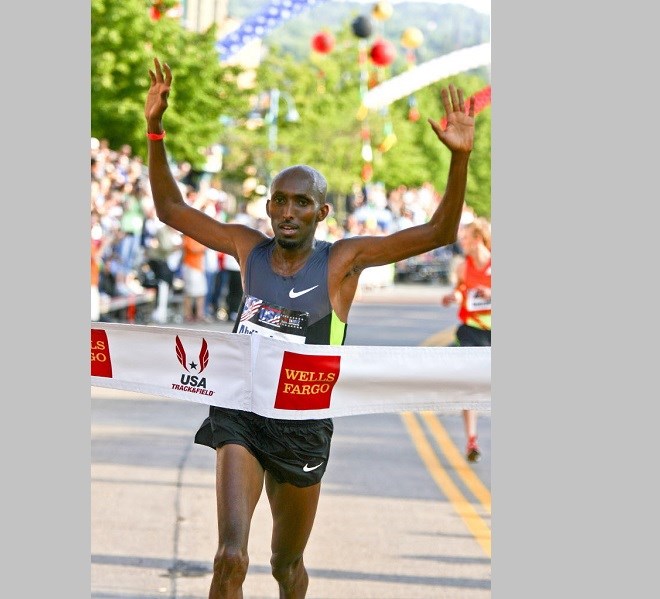
Sunday July 3, 2016
By Greg Hansen
JULY 14, 2000: ABDI ABDIRAHMAN MAKES HIS FIRST USA OLYMPIC TEAM
Abdi Abdirahman did not run a competitive race until he was a student at Pima Community College. ( Clint Austin / Duluth News Tribune 2012)
Among the thousands of assignments I’ve been given in my years at the Star, few compare to a journey to the 2000 U.S. Olympic Track and Field Trials in Sacramento.
It was the Week of Abdi.
Nine months after he became a U.S. Citizen, Abdi Abdirahman stepped to the starting line at Hornet Stadium on a hot summer night, one of 36 runners bidding to make the Olympic team at 10,000 meters.
advertisements
No one had a story like Abdi’s. Not even close. How was this even possible?He grew up in Somalia, one of 10 children of Mahamed and Halima Abdirahman; he was 13 when his family fled the anarchy of their home nation and ruler Siad Barre. Abdi’s, father, who worked as a manager for Conoco Oil in Kenya and Somalia, had a brother living in Tucson.
Abdi spoke no English and played no sports. He enrolled at Tucson High School, learned to communicate in English, graduated and got a job as a sales clerk at Mervyn’s. He had never run a competitive race in his life.
After enrolling at Pima College, Abdi met Arizona All-America distance runner Martin Keino, son of 1964 Tokyo Olympics gold medal legend Kip Keino.
“You should become a runner,” Keino suggested.
“I don’t like to run,” Abdi said.
Later that fall, at track team tryout at PCC, Abdi bit. He finished second of all the runners. He was wearing soft-soled work shoes.
Five years later, the six-time Pac-10 distance running champion battled nerves in Hornet Stadium in the race of his young life.
“He told me he was scared,” UA coach Dave Murray said later that night. “But he hung in there.”
On the 17th lap, Abdi began to chew on his jersey, his stride slowing, his mind begging him to quit.
At the west end of Hornet Stadium, Murray recognized the signs and couldn’t bear to look.
“Every time Abdi has had a bad race,” Murray said, “he has started chewing on his jersey. It had me very worried.”
Abdi considered dropping out about 20 minutes into a 29-minute race.
“Just when I was about to drop out, I told myself that it would be four years until the next Olympic trials,” he told me that night. “That’s just too long. I told myself to bear down.”
And so he did.
In the final seven laps, cheered on by 20,000 fans, the most unlikely Olympic distance runner in America gutted it out, finished third and qualified for the U.S. Olympic team. It was the capstone to a remarkable come-from-nowhere success story.
He took a victory lap, blowing kisses to the crowd. America’s 1964 Olympic 10,000-meter legend Billy Mills was among the first to congratulate Abdi.
The next morning, surrounded by Nike representatives, Abdi held a news conference near the Sacramento State campus. He had been the first in line that morning to fill out his official documents for the 2000 Sydney Olympics.
I asked Abdi if it might not have been easier to run for his native country, Somalia.
“No, because I never ran in Somalia,” he said. “I have only run in America, and now I’m an American. This is my country.”
Three years earlier, Abdi finished second in the NCAA Cross Country Championships in Lawrence, Kansas, beating, among others, his current Tucson training partner Bernard Lagat. No longer was he the mystery guest of American distance running.
Over the next dozen years, he was on the U.S. Olympic team at Athens in 2004, Beijing in 2008 and London in 2012. He moved from 10,000 meters to the marathon in London. He became the first American distance runner since Arizona grad George Young, 1960-72, to run in four Olympiads.
Abdi, who enjoys being referred to as the “Black Cactus,” finished 10th in the 2000 Olympics, 15th in 2004 and 17th in 2008. He withdrew 20 miles into the 2012 Olympic marathon with a leg injury.
Where is he now? Abdirahman, now 39, was injured and did not participate in the U.S. Olympic marathon trials in February. Nike remains his sponsor; he runs in most of the top road races in America every year. Abdi was born on New Year’s Day, 1977, in Hargeisa, Somalia.
How he did it: Several times during the 1996 cross-country season, Abdi and his PCC teammates would run the dirt trails west of the school on the same day Arizona’s cross-country team would be there.
“We’d pass each other on the trails, on our training runs, and I would always say hello,” Murray, the UA coach, said in 2000. “I wanted to stop and talk to him about running and recruiting, but that’s against NCAA rules. Abdi’s a natural runner, I could see that. But did I anticipate him being this good? No.”